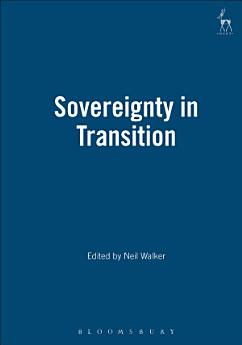Sovereignty in Transition
Neil Walker
નવે 2003 · Bloomsbury Publishing
ઇ-પુસ્તક
572
પેજ
reportરેટિંગ અને રિવ્યૂ ચકાસેલા નથી વધુ જાણો
આ ઇ-પુસ્તક વિશે
Sovereignty in Transition brings together a group of leading scholars from law and cognate disciplines to assess contemporary developments in the framework of ideas and the variety of institutional forms associated with the concept of sovereignty. Sovereignty has been described as the main organising concept of the international society of states - one which is traditionally central to the discipline and practice of both constitutional law and of international law. The volume asks to what extent,and with what implications, this centrality is challenged by contemporary developments that shift authority away from the state to new sub-state, supra-state and non-state forms. A particular focus of attention is the European Union, and the relationship between the sovereignty traditions of various member states on the one hand and the new claims to authority made on behalf of the European Union itself on the other are examined. The collection also includes contributions from international law, legal philosophy, legal history, political theory, political science, international relations and theology that seek to examine the state of the sovereignty debate in these disciplines in ways that throw light on the focal constitutional debate in the European Union.
લેખક વિશે
Neil Walker is Professor of European Law at the EUI Florence.
આ ઇ-પુસ્તકને રેટિંગ આપો
તમે શું વિચારો છો અમને જણાવો.
માહિતી વાંચવી
સ્માર્ટફોન અને ટૅબ્લેટ
Android અને iPad/iPhone માટે Google Play Books ઍપ ઇન્સ્ટૉલ કરો. તે તમારા એકાઉન્ટ સાથે ઑટોમૅટિક રીતે સિંક થાય છે અને તમને જ્યાં પણ હો ત્યાં તમને ઑનલાઇન અથવા ઑફલાઇન વાંચવાની મંજૂરી આપે છે.
લૅપટૉપ અને કમ્પ્યુટર
Google Play પર ખરીદેલ ઑડિઓબુકને તમે તમારા કમ્પ્યુટરના વેબ બ્રાઉઝરનો ઉપયોગ કરીને સાંભળી શકો છો.
eReaders અને અન્ય ડિવાઇસ
Kobo ઇ-રીડર જેવા ઇ-ઇંક ડિવાઇસ પર વાંચવા માટે, તમારે ફાઇલને ડાઉનલોડ કરીને તમારા ડિવાઇસ પર ટ્રાન્સફર કરવાની જરૂર પડશે. સપોર્ટેડ ઇ-રીડર પર ફાઇલો ટ્રાન્સ્ફર કરવા માટે સહાયતા કેન્દ્રની વિગતવાર સૂચનાઓ અનુસરો.






